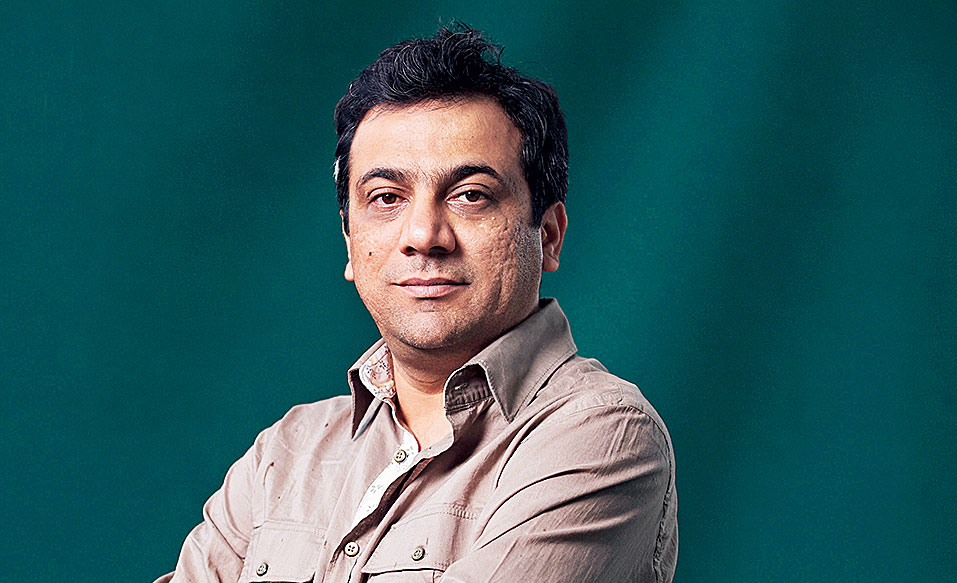A doctor stands at the end phase of his life, writing to his daughter about his life of having strayed far away from his hippocratic oath, in Mirza Waheed’s novel Tell Her Everything. Nominated for 2019 DSC Prize for South Asian Literature, the book reads like a dramatic monologue of haunting proportions. Dr K, as the father is called, is a doctor in an unnamed city in the Middle East where his job was to execute amputations for criminals as punishment by the government. He sends his daughter far away from himself as he pursues his ambitions of earning money and it is only towards the end of his life that he feels the need to explain himself to his daughter.
The author from Kashmir, a journalist of repute who is often found on Twitter actively voicing his opinions on Kashmir, is now settled in London with his family. He was in conversation with t2 about his influences and the effect of parenthood on his writing. Excerpts.
How does it feel to be nominated for the DSC prize?
I’m very pleased that a book that was hard to write and live with has found favour with the learned judges.
The narrative of Tell Her Everything takes one strongly back to Mohsin Hamid’s The Reluctant Fundamentalist. The sinister undertone is a sharp contrast to a father making peace with his past as he “confesses” to his daughter. Was that on purpose?
I admire Hamid’s work and think he’s one of the most exciting writers at work today. But I had no models in mind when I was writing Tell Her Everything. I’d had the germ of the novel — a father rehearsing what he will say, reveal, to his only child whom he hasn’t met in many years —in my head for a long time. And when I started writing, I was excited by the form it took: an imagined conversation during which both the questions and the answers are scripted, imagined, by the same person. How will he phrase his account of an eventful but unconventional professional life lived in a vastly different culture from his own? Then the idea of the letters that may or may not have been read, brought the daughter Sara’s voice to the surface with a force I couldn’t resist.
Who are your favourite authors? What kind of literature do you consume the most? Any contemporary authors who took you by surprise?
There are far too many to name one. Like many readers, I go through phases. For instance, this last year or so I have been reading and rereading Coetzee. I think Age of Iron and Waiting for The Barbarians are great works of literature and I wish more people would read them, in addition to his better-known books such as Disgrace and Life & Times of Michael K.
Of late, I have also gone back to Quratulain Hyder’s other classic Aakhir-e-Shab Ke Humsafar and its English translation Fireflies in the Mist, which also includes a fantastic essay on Hyder’s oeuvre by Aamer Hussein.
One of my favourite writers is the Indian thinker Pankaj Mishra. If you read his work, both his books and essays, you will see that he presaged a lot of what’s happening in India and the world at the moment. His last book, The Age of Anger, should be mandatory reading everywhere.
Sarah Moss’s slim novel The Ghost Wall took me by surprise recently. It’s an astonishing piece of literature. I think Arundhati Roy’s Kashmir novel, The Ministry of Utmost Happiness, is an extraordinary book, both in its scale and moral depth. Kamila Shamsie’s novel Home Fire will be read and re-read in 20 years from now and may well become a classic in time.
Currently, I’m also reading Kashmiri academic Ather Zia’s important debut book on women in Kashmir, Resisting Disappearance.
Who are you most inspired by when it comes to your writing style?
When I was younger, I once read all of Camus to see if I could write like him. Thankfully, the delusion lasted only for a short while. What I’m trying to say is one goes through phases when you think that you might be or want to be like so and so writer until you realise that whether you’re successful or not, whether lots of people read your work or only a few do, you do have your own style. For inspiration, I sometimes read Coetzee for his extraordinary gift of what might be termed as moral excavation. I also try to read poetry before embarking on a new novel. It helps me decontaminate my brain of news and other noise.
How much of Dr K’s struggle as an immigrant was from your personal experience? Especially the need to conform in an effort to belong?
It’s quite clear that Tell Her Everything is not autobiographical. But yes, I did repurpose some of my own experiences as an immigrant in London to create Dr K’s torn yet clear-sighted persona as a forever immigrant. My own experience when I first came to London all these years ago was mostly a happy one. I turned some of it upside down to see how Dr K’s character might react.
Through Dr K, you have questioned the nature of morality. According to you, are morals subjective or absolute or defined by geography or situational or something completely different?
The answer to all questions about morality is as complex as the questions. Morals can be all, some, or one of the things you ask, and they can be so at the same time. What the book tries to do is depict an ordinary man confronting his life choices and therefore his humanity. And when he does so he discovers that many of the truths he has learned about the world are subject to the same doubts and complications as himself. He derives both self-justification and pain from it all.
Having lived in Kashmir and written about it, do you feel there is a lack of thought leaders in India who could steer younger minds towards learning to form opinions about a crisis so close to home?
There is certainly a lack of ‘thought leaders’ in India who could steer the young in India towards a more compassionate, historically attuned, and, above all, a fact-based understating of Kashmir, as opposed to the full-scale mendacity broadcast every night on Indian TV.
For an author hailing from an area of conflict, do you feel that ‘social responsibility of fiction’ is imperative for an author?
When you are a novelist, writer, from a ‘troubled place’ such as Kashmir, you don’t really understand it when people say such strange things as true art should not be political, and so on. Equally, it is not as if we sit down and say, ‘today, I’m going to write a political story with a lot of social responsibility in it’. In fiction, you create an entire world and that world must hold, stand on its own, ring true. I don’t think anything is an imperative for an author except being true to the story, true to the work. Back in the day, most writers did exactly this: comment and critique their milieus while making art.
How important are awards for an author?
They are important for sustaining and sometimes even for giving life to the career of an author. We have the same bills to pay as anyone else. Novelists, whether they’re in Varanasi or Venice, are not a well-paid lot.
What is your writing process like?
I used to try and write a bit every day but since having children it’s been rather hard. I’ve had to relearn how to write while being a full-time parent. Often, I struggle until an image or an idea begins to shine a bit. If a premise stays in your head for long, refuses to shut up or fade away, then chances are you are on to something. I tend to think about characters for a long, long time before I put words on paper. I must hear some of them speak if not all before I can think of making a novel. Of course, like most writers, I make notes here and there, usually in the form of emails to self in my case.
What can we expect next from your table?
A new novel set in east London. Also, a long short story set somewhere in the high mountains of Kashmir of the past. They are slow works in progress competing for attention with my children. So far, the kids are winning hands down.











